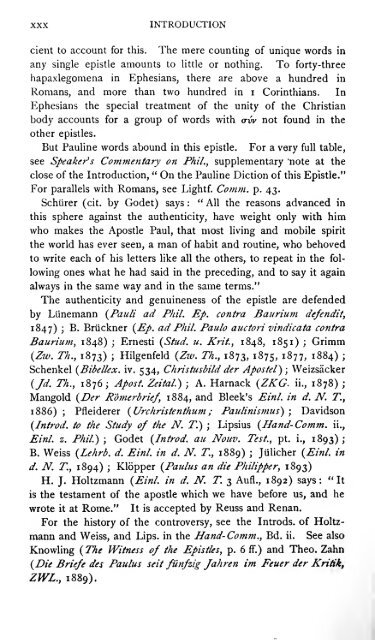Philippians and Philemon - MR Vincent - 1906.pdf
Philippians and Philemon - MR Vincent - 1906.pdf
Philippians and Philemon - MR Vincent - 1906.pdf
Create successful ePaper yourself
Turn your PDF publications into a flip-book with our unique Google optimized e-Paper software.
XXX INTRODUCTION<br />
cient to account for this. The mere counting of unique words in<br />
any single epistle amounts to little or nothing. To forty-three<br />
hapaxlegomena in Ephesians, there are above a hundred in<br />
Romans, <strong>and</strong> more than two hundred in i Corinthians. In<br />
Ephesians the special treatment of the unity of the Christian<br />
body accounts for a group of words with not found in the<br />
other epistles.<br />
But Pauline words abound in this epistle. For a very full table,<br />
see Speaker's Cotnmentary on Phil., supplementary 'note at the<br />
close of the Introduction, " On the Pauline Diction of this Epistle."<br />
For parallels with Romans, see Lightf. Comfn. p. 43.<br />
Schiirer (cit. by Godet) says : " All the reasons advanced in<br />
this sphere against the authenticity, have weight only with him<br />
who makes the Apostle Paul, that most living <strong>and</strong> mobile spirit<br />
the world has ever seen, a man of habit <strong>and</strong> routine, who behoved<br />
to write each of his letters like all the others, to repeat in the fol-<br />
lowing ones what he had said in the preceding, <strong>and</strong> to say it again<br />
always in the same way <strong>and</strong> in the same terms."<br />
The authenticity <strong>and</strong> genuineness of the epistle are defended<br />
by Liinemann {Pauli ad Phil. Ep. contra Baurium defendit,<br />
Bruckner {^Ep. ad Phil. Paulo auctori vindicata contra<br />
') 1847) B•<br />
Baurium, 1848) ; Ernesti {Stud. u. Krit., 1848, 1851) ; Grimm<br />
{Zw. Th., 1873) ; Hilgenfeld {Zw. Th., 1873, 1875, 1877, 1884) ;<br />
Schenkel {Bibellex. iv. 534, Christusbild der Apostel) ; Weizsacker<br />
{Jd. Th., 1876; Apost. Zeital.) ; A. Harnack {ZKG. ii., 1878) ;<br />
Mangold {Der R'dmerbrief, 1884, <strong>and</strong> Bleek's Einl. in d. N. T.,<br />
1886) ; Pfleiderer {Urchristenthum ; Paulinis^nus) ; Davidson<br />
{Introd. to the Study of the N. T.) ; Lipsius {H<strong>and</strong>-Comm. ii.,<br />
Einl. z. Phil.) ; Godet (In trod, au Nouv. Test., pt. i., 1893)<br />
B. Weiss (Lehrb. d. Einl. in d. N. T, 1889) ; Julicher {Einl. in<br />
d. N. T., 1894) ; Klopper {Paulus an die Philipper, 1893)<br />
H. J. Holtzmann {Einl. in d. N. T. 3 Aufl., 1892) says: "It<br />
is the testament of the apostle which we have before us, <strong>and</strong> he<br />
wrote it at Rome." It is accepted by Reuss <strong>and</strong> Renan.<br />
For the history of the controversy, see the Introds. of Holtzmann<br />
<strong>and</strong> Weiss, <strong>and</strong> Lips, in the H<strong>and</strong>-Comm., Bd. ii. See also<br />
Knowling ( The Witness of the Epistles, p. 6 ff.) <strong>and</strong> Theo. Zahn<br />
{Die Briefe des Paulus seit fUnfzig Jahren im Feuer der Kritik,<br />
ZWL., 1889).<br />
;





